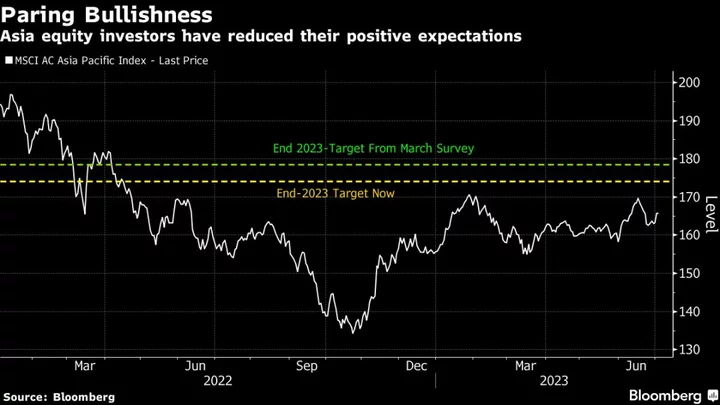Investors lowered their expectations of gains in Asian equities this year as optimism fades about the prospects of looser monetary policy and China’s economic outlook.
That’s the view of most of the 17 strategists and fund managers surveyed by Bloomberg News. The MSCI Asia Pacific Index is seen rising to 174 by year end, according to the average of 13 responses to a poll late last month. The forecast implies gains of 5% from Tuesday’s close, and compares with the 178.5 level predicted in a similar Bloomberg survey three months ago.
Should the prediction prove prescient, the Asian benchmark would end the year below its March 2022 level, when the Federal Reserve delivered its first rate hike in three years, implying that investors aren’t yet ready to factor in any significant monetary policy shift.
Most survey participants said they’d increased, or advised others to raise, holdings in semiconductor-related firms as well as so-called defensive stocks that are less affected by economic swings. Some also saw opportunity in shifting funds geographically in anticipation of Asian stocks gaining at a faster pace than global peers.
“We see a medium-term opportunity opening once again to shift allocations from West to East,” said Michael Kelly, the global head of multi-asset at PineBridge Investments. While noting that that earnings growth in Asia and emerging markets has stalled and China’s policy outlook remains unclear, Kelly sees valuations enticing investors into the region. “Asian and other EM asset classes are attractively valued relative to most core markets – a dynamic that hasn’t occurred for some time.”
Asia’s regional equity gauge has underperformed the S&P 500 Index by about 10% this year, increasing its valuation discount to 29% against the US measure from 25% at the start of the year, according to data compiled by Bloomberg. The MSCI Asia Pacific Index trades at some 14 times of its one-year forward earnings, while the S&P 500 Index stands at 19 times.
On Wednesday, the regional index fell as much as 0.7% as slower growth in China’s services sector added to signals that the country’s economic recovery is weakening. Stocks declined in most Asia-Pacific markets following a holiday in the US.
China is Key
“China’s really the main variable,” said Xin-Yao Ng, who manages Asian stocks at abrdn Plc. “We’re structurally cautious on China.”
Maybank Securities’ Head of Prime Brokerage Tareck Horchani had the most bearish view, with a target of 156 attributed to his expectation that China’s equities will continue to be a drag. Aletheia Capital analyst Nirgunan Tiruchelvam and Oanda Asia Pacific Pte.’s analyst Kelvin Wong were the most bullish, each seeing mainland stocks driving the Asian benchmark to 190.
Among other markets, India and Japan stocks may get a boost from improving economic growth and supportive policies, according to some survey participants. Equities in Southeast Asia, however, weren’t viewed favorably, a reverse from the previous poll when they were.
Technology shares were seen benefiting from the potential of artificial intelligence, while views were split on financial stocks due to the confluence of slowing economic growth and high interest rates.
“We retain a positive outlook for Asian technology stocks, in particular semiconductors, which benefit from strong secular tailwinds such as digitalization and artificial intelligence, as well as tentative signs that the cycle is bottoming. said Christian Abuide, head of asset allocation at Lombard Odier. “We have a neutral view on financials.”
Continued interest rate increases by the Federal Reserve, tensions between Washington and Beijing and a slowing Chinese economy were considered by respondents as the most likely factors to derail the outlook for Asian equities, while opportunity may emerge should the Fed soften its monetary policy stance.
“The biggest risks in the second half would most likely stem from a more negative outlook on global growth or strengthening US dollar, as well as geopolitical tensions that would disrupt the underlying equity stories,” said Hilde Jenssen, head of fundamental equities at Nordea Asset Management.
--With assistance from Winnie Hsu and John Cheng.
(Updates to add Asian stocks’ moves in seventh paragraph.)
Author: Abhishek Vishnoi, Ishika Mookerjee and Georgina McKay









